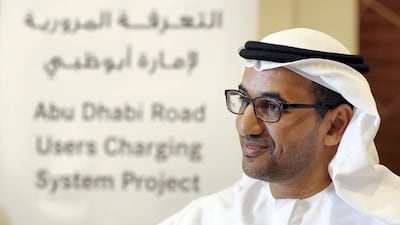A new road toll system being introduced in Abu Dhabi will be accompanied by major investment in public transport to help people ditch their cars, a senior transport official has said.
Ibrahim Sarhan Al Hamoudi said that while the new policy is expected to generate Dh400 million per year in revenue, encouraging people to embrace greener modes of transport rather than raising cash was the main purpose of the tolls.
Officials studied existing toll systems in Dubai, Stockholm and London when designing the policy for the UAE capital. However, while the tolls in those cities have widely been seen as a success, they have more comprehensive public transport systems than the UAE capital, which relies on buses and taxis, meaning there were more alternatives to driving.
Mr Al Hamoudi, who is an acting executive director at the Department of Transport, said that the Abu Dhabi’s public transport infrastructure will continue to expand, following a 25 per cent increase in its bus fleet between 2017 and 2018.
He told The National that 300 extra buses have now been ordered, with "other plans" that would move the public transport network to the "next level" to be announced in future.
“You have to go step by step,” he said. “By adding 300 buses, that serves short trips, intercity and commuters. When our buses become mature, advanced and overcrowded, we will move to the next levels. Currently we are working on other plans, which we will announce at the right time.
“When Dubai announced their tolls in 2007, there was no metro. Did it help? Yes it did, it incentivises people to change their behaviour. I think we will have these systems at the right time, when the city needs them.”
There was a six per cent increase in registered vehicles in Abu Dhabi last year, increasing pressure on the road network. The Dh400m the tolls are expected to raise is compared with annual spending on roads of between Dh3 billion and Dh4bn.
The Department of Transport hopes that the tolls will reduce traffic during weekday rush hours by roughly 8,000 vehicles per day.
Only around nine per cent of journeys in Abu Dhabi will be affected by the new charges with the vast majority taking place within Abu Dhabi island. For those that are affected, modes of transport such as buses and motorcycles are exempt, offering ways in which the charges can be avoided, Mr Al Hamoudi said.
Electric vehicles will be exempt for two years, in an effort to promote their use. The exemption will end in 2021, when it is expected that their use will have become more widespread.
Metro and tram systems for Abu Dhabi have previously been planned, and while these are yet to materialise, they remain options for the future.
While the Salik road toll system in Dubai has gradually expanded over the years, there are currently no plans for more gates in Abu Dhabi, other than the four already announced.
Asked how he would respond to residents who are unhappy at the prospect of a new fee, which comes after the introduction of other charges such as VAT, Mr Al Hamoudi said that he believed people would welcome the system once they understood the benefits.
He said: “I would like to discuss it from a different angle, if an ambulance would reach the hospital five minutes earlier, would you be happy or not? If your kid goes to school and spends 15 minutes less on the bus, will you be happy or not? Citizens in Abu Dhabi should answer these questions. If the community understand the benefits, they will be happy.”


